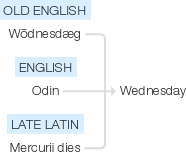Wednesday
Old English Wōdnesdæg ‘day of Odin’, named after the Germanic god Odin or Woden, the supreme god; translation of late Latin Mercurii dies, Odin being equated with the Roman god Mercury. Compare with Dutch woensdag .
wiktionary
From Middle English Wednesday, Wednesdai, Wodnesdei, from Old English wōdnesdæġ(“Wednesday”), from Proto-West Germanic *Wōdanas dag, a calque ( interpretātiō germānica) of Latin diēs Mercuriī(“day of Mercury”) and Koine Ancient Greek ἡμέρα(hēméra, “day”) Ἑρμοῦ(Hermoû, “of Hermes”), via an association of the god Odin (Woden) with Mercury and Hermes.
Cognate with West Frisian woansdei(“Wednesday”), Dutch woensdag(“Wednesday”), Dutch Low Saxon woonsdag(“Wednesday”), dialectal German Wodenstag(“Wednesday”), Danish onsdag(“Wednesday”), Norwegian Bokmål onsdag(“Wednesday”), Swedish onsdag(“Wednesday”).
etymonline
Wednesday (n.)
fourth day of the week, Old English wodnesdæg "Woden's day," a Germanic loan-translation of Latin dies Mercurii "day of Mercury" (compare Old Norse Oðinsdagr, Swedish Onsdag, Old Frisian Wonsdei, Middle Dutch Wudensdach). For Woden, see Odin.
Contracted pronunciation is recorded from 15c. The Odin-based name is missing in German (mittwoch, from Old High German mittwocha, literally "mid-week"), probably by influence of Gothic, which seems to have adopted a pure ecclesiastical (i.e. non-astrological) week from Greek missionaries. The Gothic model also seems to be the source of Polish środa, Russian sreda "Wednesday," literally "middle."
